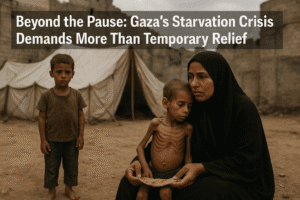Beyond the Pause: Gaza’s Starvation Crisis Demands More Than Temporary Relief
Gaza faces catastrophic, man-made famine, where the entire population of over 2 million endures severe food insecurity, one-third going days without eating, and nearly half a million confront famine conditions. Children bear the brunt, constituting 80% of starvation deaths; 24 young children perished just in July, with over 5,000 treated for acute malnutrition as the health system collapses.
While Israel’s daily humanitarian pauses allowing some aid trucks are a minimal step, UN agencies unanimously stress they are woefully insufficient to stem the crisis. The WHO deems the spiralling malnutrition and deaths “entirely preventable,” citing deliberate aid obstruction despite WFP having enough food stockpiled to feed everyone for three months.
Beyond silent starvation, over 1,000 people have been killed seeking aid. UN leaders urgently declare an immediate, permanent ceasefire is the only solution enabling safe, unfettered aid delivery at the necessary scale, condemning the international failure to act as a profound moral injustice history will judge harshly.

Beyond the Pause: Gaza’s Starvation Crisis Demands More Than Temporary Relief
The announcement of daily “humanitarian pauses” by Israel, welcomed cautiously by UN agencies, feels less like a solution and more like a small bandage on a hemorrhaging wound. While any potential increase in aid flow is critical, the stark reality on the ground reveals a catastrophe spiralling beyond the reach of temporary windows. This isn’t just a food shortage; it’s a systematic collapse where children are dying of starvation in the 21st century, and the world’s response remains tragically inadequate.
The Pause: Progress Measured in Drops, While the Need is an Ocean
Yes, the initial reports of over 100 aid trucks moving during the first pause are a positive step. For families who have gone days without eating, any food arriving is a lifeline. UN Emergency Relief Coordinator Tom Fletcher rightly acknowledged this as “progress.” But the scale required to avert famine is monumental. The World Food Programme (WFP) states it has enough food stockpiled or en route to feed Gaza’s 2.1 million people for three months – yet it cannot reliably deliver it. The pauses, while a necessary concession, are fundamentally insufficient. They do not address:
- The Underlying Obstruction: Aid workers continue to face “extreme risks and logistical hurdles.” The UN cites deliberate obstruction as a core reason for the crisis. Pauses don’t guarantee safe passage within Gaza, where accessing distribution points or even moving between neighborhoods remains perilous.
- The Scale of Catastrophe: As UNICEF starkly states, “The entire population… is severely food insecure.” One in three people haven’t eaten for days. Malnutrition isn’t rising; it’s exploding. The WHO reports a “dangerous trajectory,” with 63 of the 74 recorded malnutrition deaths this year occurring in July alone, including 24 children under five. These deaths are marked by severe wasting – a painful, preventable end.
- The Collapsing System: Gaza’s health infrastructure is “on the brink.” Malnutrition treatment centers are overwhelmed, lacking fuel and supplies, staffed by exhausted workers. Disease spreads rapidly without clean water or sanitation. Over 40% of pregnant and breastfeeding women are severely malnourished, impacting the next generation.
Children: The Silent Faces of a Man-Made Famine
The statistics are shattering: 80% of reported starvation deaths are children. Over 5,000 children were treated for malnutrition in July alone. UNICEF describes children “trapped in a nightmare,” deprived of survival’s basics. These aren’t abstract numbers; they represent toddlers wasting away, infants too weak to cry, children dying before reaching overwhelmed clinics. The WHO calls this crisis “entirely preventable.” That knowledge adds a layer of profound moral failure to the tragedy.
Beyond Aid Trucks: The Deadly Search for Survival
The crisis manifests not only in silent deaths from hunger but in violent ones while seeking help. WHO reports over 1,000 people killed and 7,000 injured since late May simply trying to access aid. Families are forced into impossible choices: stay home and starve, or risk death trying to reach food distribution points operating under a militarized system described by the UN Human Rights Chief as failing and creating a “dystopian landscape.”
The World’s Test: Lip Service vs. Lifesaving Action
The upcoming High-Level Conference on Palestine faces a stark test. UN Human Rights Chief Volker Türk issued a powerful warning: “Countries that fail to use their leverage may be complicit in international crimes.” He called Gaza a scene of “total destruction” where families are killed searching for food. The condemnation of Hamas’s October 7th attacks stands, but as Türk emphasized, “the scale of suffering inflicted on Palestinians since then cannot be justified.”
The Unavoidable Conclusion: Pauses Are Not Enough
The message from every UN agency on the ground is unified and urgent:
- An immediate and permanent ceasefire is non-negotiable. Only this can create the conditions for aid to flow at the necessary scale and safety.
- Unfettered humanitarian access is essential. Bureaucratic hurdles and movement restrictions must be lifted entirely. Commercial trucks, vital for supplementing aid, need guaranteed safe passage.
- A massive, sustained surge of diverse, nutritious food and medical supplies is needed now, alongside protection for civilians, health workers, and humanitarian operations.
- Accountability and political will are paramount. The international community must move beyond statements and wield tangible pressure to end the unlawful practices fueling this disaster.
Humanitarian pauses offer a fleeting glimpse of hope, a chance to save some lives in the immediate term. But they are a stopgap, not a solution. Gaza’s children are dying of starvation not because food doesn’t exist, but because a sustained political failure prevents its delivery. The world possesses the means to stop this famine. The question is whether it possesses the collective will to demand and enforce the only actions that will truly matter: a permanent ceasefire and unconditional access for aid. History, and the emaciated children of Gaza, will judge the answer harshly if it does not.
You must be logged in to post a comment.